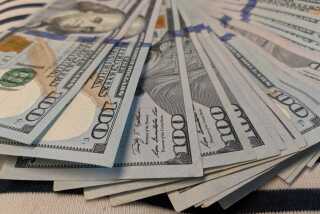Treasury Secretary Says He Backs Strong Dollar
- Share via
NEW YORK — U.S. Treasury Secretary Henry M. Paulson Jr., making his public debut as the Bush administration’s top economic spokesman, said Tuesday that soaring costs of federal entitlement programs were a key economic threat and that he supported a strong U.S. dollar.
Speaking at Columbia University’s business school, Paulson said that it appeared U.S. economic growth was slowing to a more sustainable pace and that it was vital to maintain open markets that would help keep the economy growing.
In his speech and in two TV appearances, Paulson said his policy toward the U.S. dollar was unchanged from that of John W. Snow, whom he succeeded last month.
“I believe that a strong dollar is in our nation’s interest and that currency values should be determined in open and competitive markets in response to underlying economic fundamentals,” Paulson said at Columbia.
Those markets had other ideas about the dollar Tuesday: They pushed the currency to an eight-week low against the euro in New York. The euro ended at $1.282, up from $1.277 on Monday. The dollar also slipped against the yen, to 114.52 from 114.56.
The euro has risen 8% against the dollar this year. The yen has risen 3%.
Paulson, a former chairman of brokerage giant Goldman Sachs, said the economy was strong but “in transition” to a slower growth rate that was more sustainable. The government said Friday that U.S. growth slowed abruptly in the second quarter to a 2.5% rate from 5.6% in the first quarter.
On CNBC, Paulson dismissed the possibility that the economy was at greater risk of recession. “Absolutely not,” he replied to the suggestion.
He also said that President Bush had asked him to focus on reforming the Social Security, Medicare and Medicaid programs after the November congressional elections with the goal of seeking a bipartisan solution to restrain ballooning costs.
Paulson offered no new ideas on how the programs could be reformed to meet the financing needs of 78 million baby boomers, but he said a solution must be found soon.
As for the dollar, Brown Bros. Harriman currency analyst Meg Browne said Paulson’s remarks had done nothing to counter an impression that the White House was prepared to see the dollar keep weakening, as it has for most of this decade.
A weaker dollar makes U.S. exports less expensive abroad but also reduces Americans’ purchasing power.
More to Read
Inside the business of entertainment
The Wide Shot brings you news, analysis and insights on everything from streaming wars to production — and what it all means for the future.
You may occasionally receive promotional content from the Los Angeles Times.










